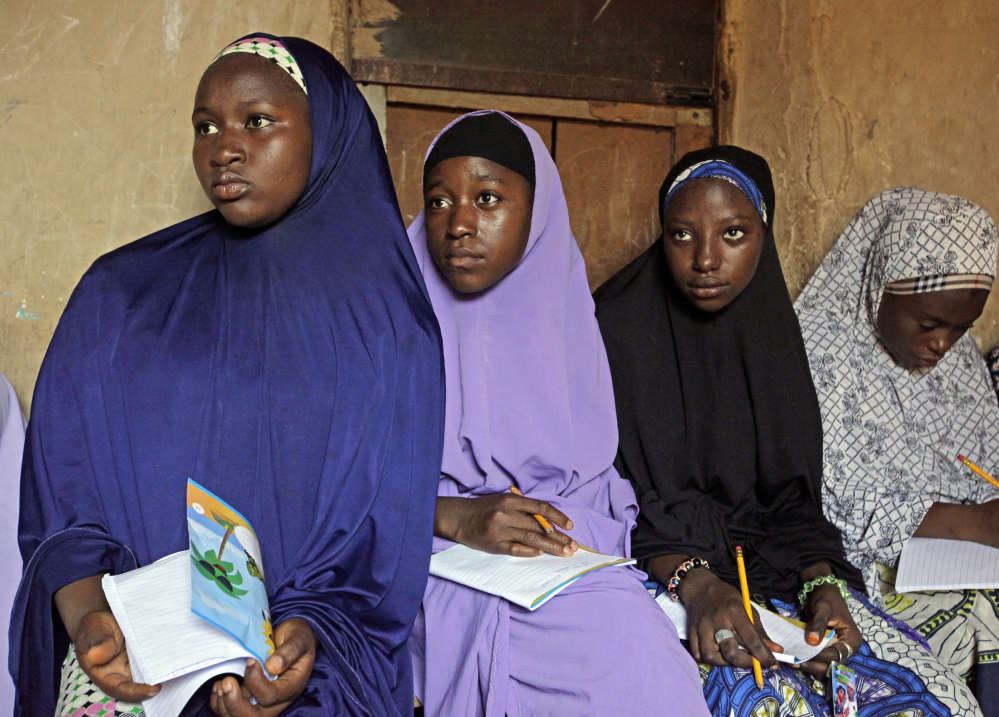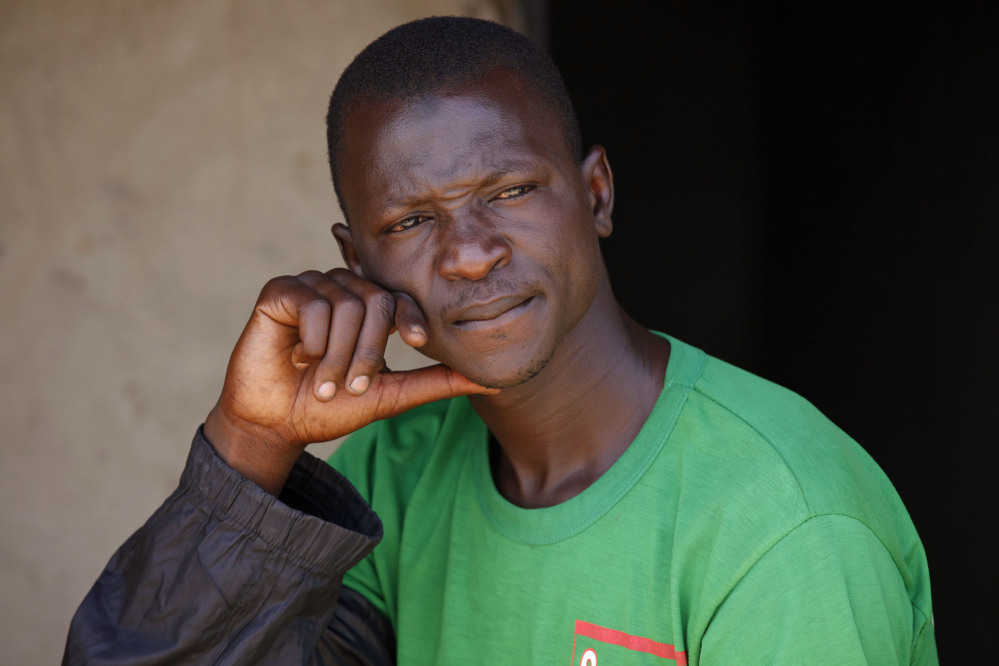KADUNA, Nigeria — By the time she ran away, Maimuna bore the scars of a short but brutal marriage.
Her face swelled so much from her husband’s beating that doctors feared he had dislocated her jaw. Her back and arms bristled with angry welts where her father had whipped her for fleeing to him. She was gaunt from hunger, dressed in filthy rags. And barely a year after her wedding, she was divorced.
It would be a tragic story for a woman of any age. But for Maimuna Abdullahi, it all happened by the time she was 14.
“I’m too scared to go back home,” she whispers. “I know they will force me to go back to my husband.”
Maimuna is one of thousands of divorced girls in Nigeria, children who were forced into marriage and have since run away or been thrown out by their husbands. They are victims of a belief that girls should get wed rather than educated, which drew the world’s attention after Boko Haram terrorists abducted more than 200 schoolgirls two months ago and threatened to marry them off. Most are still missing.
Maimuna’s former husband, Mahammadu Saidu, blames her few years of school for her disobedience. A handsome man of 28, he does not deny beating her. “She had too much ABCD,” he says. “Too much ABCD.”
CUSTOM OF THE LAND
Nigeria, a young country of about 170 million, has one of the highest rates of child marriage in the world. The law of the land states that the age of consent, and thus of marriage, is 18. However, the custom of child marriage is still ingrained.
Across the country, one in five girls are married before the age of 15, according to the United Nations. In the poor Muslim north, where most people eke out a living from the soil, that number goes up to one in two. Child marriage here is often considered acceptable under shariah, or Islamic law.
This is also where Boko Haram is trying to impose its extreme version of Islam. Girls as young as 5 now hide their heads and shoulders in hijabs, a rare sight just a few years ago. Some become wives as early as 9.
There are no official numbers for just how many of these girls get divorced, often ending up destitute and shunned by their families. But they are all too visible. A few miles from where Maimuna lives, children her age and younger sell their bodies to truck drivers, flitting in and out of vehicles. A few girls eye potential customers from the shade of a mango tree.
Maimuna was saved from this fate by Saadatu Aliyu, who has turned an old family home into a school for divorced girls. At the Tattalli Free School, which gets by on private donations, a couple of dozen girls gather in the courtyard for a sewing lesson. Many sit on the floor because there’s not much furniture beyond two benches. Toddlers mill around, the children of divorced girls who came in pregnant.
“Nobody knows how many thousands of them there are,” says Aliyu of the girls. “That’s why we have so many prostitutes, and very young ones, in the north.”
Maimuna grew up on the outskirts of Kaduna, in a half-finished brick building on the edge of a middle-class suburb. Her father, a farmer called Haruna Abdullahi, picks up a stone and throws it at a stray dog as scrawny as he is. At 45, he’s been married for 30 years. He has fathered eight children, one of whom died in childbirth.
“It’s our culture to give our girls in marriage,” he says in a reasoning tone. “From the age of 12, a girl can go to her husband’s house.”
His wife, Rabi Abdullahi, nods, and asks her husband’s permission before talking. She too was a child when she married, although she does not know exactly how old.
“It is our way of life,” she says. “In my day, a bride would never dare to run away.”
Her life is hard, she says, but her marriage good. She insists “This time I will marry a girl of 12, so that she will do what I want to do,” he says. that her husband is not a cruel man, pointing to a well he built so she did not need to walk more than a mile to collect water.
The tradition of child marriage is rooted in poverty and a lack of education. This is a part of the world where most people do not have running water, electricity or indoor toilets, where children get only three or four years of schooling. A marriageable daughter can be a farmers’ biggest asset, bringing in a bride price and meaning one less mouth to feed.
So in late 2012, Maimuna’s father arranged to marry his eldest daughter to his best friend’s eldest son. The son, Saidu, paid a dowry of $210 or 35,000 naira for Maimuna – more cash than Abdullahi has had in his life. She was 13, and he twice her age.
Saidu farms his own plot of land and owns a small motorbike, making him relatively well off and eligible. He says he has known Maimuna all his life, and waited years for her to reach marriageable age.
Saidu left his village school at fifth grade, the highest level offered, and says he regrets it.
He says he promised Maimuna she could carry on going to school, even if it meant he had to find work in town. But he also worried.
“If she is educated, she will be looking down on me because I didn’t go to school, so she will be the husband and I will be the wife,” he said.
Maimuna said she did not love him and begged her father to let her stay in school. She had always been a good daughter, obedient, hard-working, so her stubborn refusal to accept her marriage surprised her parents.
FELT LIKE A SLAVE
Maimuna settled into a new life where she felt like a slave. When she wasn’t working in the fields, she was cleaning, carrying water and firewood, cooking and at the beck and call of her husband’s demanding parents. He never kept his promise to let her go to school.
When she objected to her treatment, her husband locked her into their hut, for days. Nine months ago, she took off, escaping to her father and begging him to let her return home. Instead, he whipped her until her back was raw. Then he summoned her husband and forced her to go back to him.
Saidu, humiliated and furious, beat her. She fled once again, this time to a sympathetic aunt in a nearby village.
Maimuna still feared she could be forced back. So she went to Kaduna, where she now shares one cramped room with her cousin’s family. It’s just a short walk away from Tattalli school.
When Maimuna showed up at the school, she had been badly beaten and refused to speak, says teacher Victoria Dung. They took her to the hospital, where doctors found she was severely malnourished.
Her husband waited the customary three months to make sure there was no baby. Then he declared himself divorced.
Saidu says he no longer cares for Maimuna and will move on.
“This time I will marry a girl of 12, so that she will do what I want to do,” he says. “Because if you marry a girl who is older, then she will not listen to you.”
A sly smile curls his lips as he looks at Maimuna’s 10-year-old sister, Hafsat.
Send questions/comments to the editors.




Success. Please wait for the page to reload. If the page does not reload within 5 seconds, please refresh the page.
Enter your email and password to access comments.
Hi, to comment on stories you must . This profile is in addition to your subscription and website login.
Already have a commenting profile? .
Invalid username/password.
Please check your email to confirm and complete your registration.
Only subscribers are eligible to post comments. Please subscribe or login first for digital access. Here’s why.
Use the form below to reset your password. When you've submitted your account email, we will send an email with a reset code.